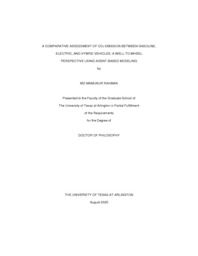
ATTENTION: The works hosted here are being migrated to a new repository that will consolidate resources, improve discoverability, and better show UTA's research impact on the global community. We will update authors as the migration progresses. Please see MavMatrix for more information.
Show simple item record
| dc.contributor.advisor | Rogers, Jamie | |
| dc.contributor.advisor | Zhou, Yuan | |
| dc.creator | Rahman, Mdmamunur | |
| dc.date.accessioned | 2022-08-24T15:15:46Z | |
| dc.date.available | 2022-08-24T15:15:46Z | |
| dc.date.created | 2020-08 | |
| dc.date.issued | 2020-08-18 | |
| dc.date.submitted | August 2020 | |
| dc.identifier.uri | http://hdl.handle.net/10106/30876 | |
| dc.description.abstract | Road transports in the U.S. are almost entirely dependent on the consumption of fossil fuel. This high dependency on fossil fuel is significantly contributing to carbon dioxide (CO2) emission, one of the leading Green House Gases (GHGs) responsible for global warming. Electrification of passenger vehicles could be an effective strategy to curb GHG emissions. Though Electric Vehicles (EVs) have zero tailpipe emissions, the power required to charge EV batteries may not necessarily come from carbon-free power plants. In this study, for a comprehensive comparison between EV and Gasoline Vehicle (GV), we developed an agent-based simulation model for the entire energy pathway (Well-To-Wheel) and estimated the associated CO2 emissions. Taking into consideration the electricity production mix of the 50 U.S. states, our simulation results revealed that the benefits of EVs are not the same across all states. Unfortunately, in some states where the major portion of electricity comes from dirty energy sources, e.g., coal, oil, or gas fired power plants, EV might emit double the amount of CO2 to the environment as GV. We also studied the performance of Plug-in Hybrid Electric Vehicle (PHEV), and on average, in most states, PHEV performs environmentally better than EV according to the year 2018 energy mix data. We conducted a detailed sensitivity analysis of these vehicles under the city and highway driving cycles. These research findings will help decision-makers design effective policies for EV and PHEV adoption to achieve maximum environmental benefits. | |
| dc.format.mimetype | application/pdf | |
| dc.language.iso | en_US | |
| dc.subject | Vehicular Emissions, Electric Vehicle, Gasoline Vehicle, Green House Gases, Agent-Based Modeling, Traffic Simulation | |
| dc.title | A COMPARATIVE ASSESSMENT OF CO2 EMISSION BETWEEN GASOLINE, ELECTRIC, AND HYBRID VEHICLES: A WELL-TO-WHEEL PERSPECTIVE USING AGENT-BASED MODELING | |
| dc.type | Thesis | |
| dc.contributor.committeeMember | Hyun, Kate | |
| dc.degree.department | Industrial and Manufacturing Systems Engineering | |
| dc.degree.name | Doctor of Philosophy in Industrial Engineering | |
| dc.date.updated | 2022-08-24T15:15:46Z | |
| thesis.degree.department | Industrial and Manufacturing Systems Engineering | |
| thesis.degree.grantor | The University of Texas at Arlington | |
| thesis.degree.level | Doctoral | |
| thesis.degree.name | Doctor of Philosophy in Industrial Engineering | |
| dc.type.material | text | |
Files in this item
- Name:
- RAHMAN-DISSERTATION-2020.pdf
- Size:
- 3.014Mb
- Format:
- PDF
This item appears in the following Collection(s)
Show simple item record


